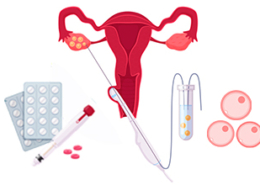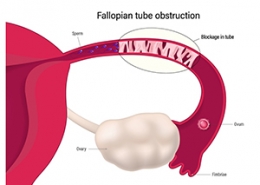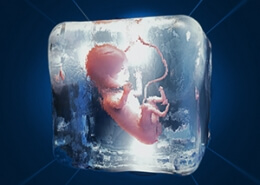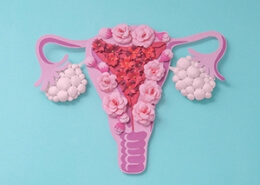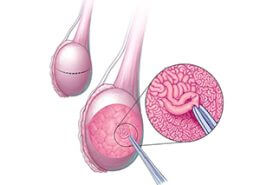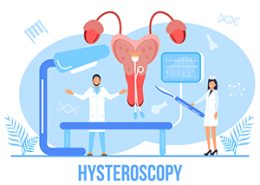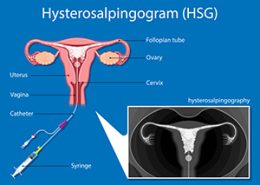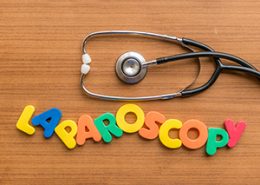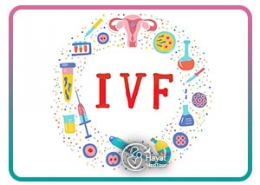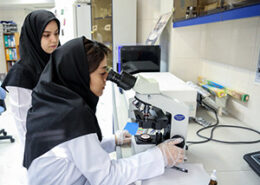Frozen Embryo Transfer; Advice and Cares
Sometimes, in the process of infertility treatment with the help of IVF and ICSI methods, all or some of the created embryos are frozen and preserved for future transfer. When the couple’s conditions are suitable for the transfer of frozen embryos, the frozen embryos are prepared for transfer to the mother’s uterus. Scientific research shows that the success rate of frozen embryo transfer is not only lower than fresh embryo transfer, but frozen embryo transfer also leads to the birth of healthier babies. This article will examine the reasons for embryo freezing, how to transfer frozen embryos, the necessary care, and advice after embryo transfer.
When are the embryos frozen in the IVF process?
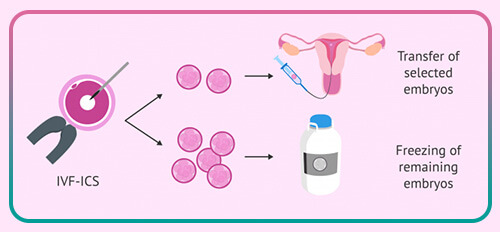
IVF is one of the effective methods of treating infertility. The IVF process begins with the use of hormonal drugs by the patient. These medicines stimulate the ovaries to release more eggs in an IVF cycle. In the next step, the specialist doctor picks up the mature eggs from the ovaries during an outpatient procedure. Then the eggs are fertilized with male sperm in the laboratory and an embryo is formed. All or some of the embryos may be frozen in the IVF process for some reason. These reasons are:
1- Usually, many embryos are formed in each IVF cycle, while in each embryo transfer, one or two embryos are transferred to the mother’s uterus. Therefore, the remaining embryos are frozen and stored for transfer in the next cycles. If the first embryo transfer is successful, the couple will use frozen embryos to have subsequent children. If IVF fails, frozen embryos are used for subsequent attempts. (Learn more about causes of IVF failure: Reasons for the failure of IVF )
2- In many cases, the doctor allows the transfer of fresh embryos, and the embryos are transferred to the mother’s uterus in the same IVF cycle. But in some cases, the doctor suggests that the woman’s uterus and ovaries rest for one or two monthly periods after drug stimulation and ovulation. This break helps the size of the ovaries return to normal, and the thickness of the uterus increases for pregnancy. Therefore, the embryos are frozen to be ready for transfer at the right time.
3- In cases where the couple is worried about the transmission of genetic diseases to their children, the PGD or PGS method is used to check the embryos. In this case, the embryos are frozen in the IVF process until the results of the genetic tests are determined. This will help the doctor to choose healthy embryos for transfer to the mother’s uterus.
4- In some cases, the mother’s uterus is not ready to receive the fetus due to uterine problems. Therefore, the embryos are frozen until the problems of the mother’s uterus are solved and the thickness of the uterus reaches the desired size. To identify and resolve uterine problems, the doctor may suggest HSG, hysteroscopy, or laparoscopy.
5- The couple may not intend to have children at the moment, but they are worried that the quality of eggs and sperm will decrease with age.
Therefore, they proceed to form embryos at young ages, and the frozen embryos are stored for future pregnancy.
6- Suffering from some specific diseases can reduce fertility and even cause premature menopause. Therefore, the formation of embryos and the freezing of embryos before carrying out treatment procedures, such as chemotherapy, radiation therapy, etc., can preserve the possibility of pregnancy in the future for the couple.
How do you prepare your body for a frozen embryo transfer?

It is better to prepare yourself for a successful transfer by taking steps. The cares that you should pay attention to before transferring the embryo are:
-
Improving lifestyle
Improving lifestyle is one of the most important measures before the transfer of frozen embryos. Doctors recommend eating a healthy and nutritious diet at least two to three months before embryo transfer. Consuming vegetables and fruits, drinking 8 glasses of water a day, reducing caffeine consumption, avoiding fast foods and industrial foods, avoiding smoking, alcohol, and drugs, etc., are among the care before embryo transfer.
-
The proper weight
The proper weight has a significant effect on the success of embryo transfer. Therefore, before embryo transfer, it is necessary to maintain a balanced weight with regular exercise and proper nutrition.
-
Getting enough sleep
Getting enough sleep increases the chance of embryo implantation and can contribute to a healthy pregnancy and increase the success of the transfer.
-
Taking medicinal supplements
It is recommended to take some medicinal supplements before embryo transfer. Folic acid and vitamin D are among the supplements that increase the chances and help the health of the pregnancy.
But you should note that you should consult your doctor before taking supplements.
-
Reduced stress
Frozen embryo transfer is usually less stressful than fresh embryo transfer. Because couples have already completed part of the treatment process and enter the stage of embryo transfer with less stress. . But still, there is always concern about the result of the transfer. Reducing stress and thinking positively can help you get positive results.
Regular use of medications
To prepare the uterus and increase its thickness, the doctor prescribes hormonal drugs. These drugs should be taken regularly according to the doctor’s order so that the uterus is ready for embryo transfer.
Learn more about IVF success factors: Tips to increase the chances of IVF success
How is frozen embryo transfer performed?
It is better to transfer frozen embryos at least two months after ovulation. Before embryo transfer, the uterus must be prepared to accept the embryo. Therefore, a woman should see a doctor a week before the start of her period or at least until the first day of menstruation. At this time, the doctor examines the condition of the ovaries, uterus, and endometrium by performing an ultrasound. If the conditions of the uterus are suitable, the doctor prescribes estrogen drugs to prepare the uterus. These drugs are usually taken from the first or second day of menstruation.

After taking the drugs, the woman undergoes an ultrasound again on the 10th to 14th day of menstruation to check the thickness of the uterus. If the uterus and endometrium are in proper condition for implantation, the time of embryo transfer is determined. At this time, in addition to estrogen-containing drugs, progesterone-containing drugs are prescribed.
On the day of embryo transfer, the desired embryos are thawed and transferred to the mother’s womb during an outpatient procedure. The use of all medications should be continued after the embryo transfer and until the day of the pregnancy test. It is usually recommended to take a pregnancy test two weeks after embryo transfer.
What care is required after the frozen embryo transfer?
Carrying out some care after the embryo transfer helps increase the probability of embryo implantation in the mother’s uterus. These cares include:
- Regular use of medications and Medication-Dietary Supplement
- Healthy and nutritious food
- Drink enough water
- Avoiding absolute rest (absolute rest and insufficient movement increase the possibility of blood clots and prevent proper blood supply to the fetus)
- Avoiding alcohol and drugs
Avoiding sexual intercourse for a few days after embryo transfer (sexual intercourse can increase uterine contractions)
- Keeping calm and thinking positively
Is it better to transfer frozen or fresh embryos?
A scientific study on 80,000 IVF cases in the United States of America shows that the success rate of fresh and frozen embryo transfer depends on the hormonal conditions of the mother’s uterus. These studies show that women with many eggs in an IVF cycle have a higher chance of getting pregnant with frozen embryo transfer in subsequent cycles, and women with fewer eggs have a higher chance of getting pregnant with fresh embryo transfer.
However, other scientific studies show that the transfer of frozen embryos leads to the birth of healthier babies. In addition, women who use frozen embryos for pregnancy experience fewer complications during pregnancy, and the possibility of the premature birth of their baby is also reduced. Therefore, frozen embryo transfer can be more successful than fresh embryo transfer.
The reason why the transfer of frozen embryos leads to the birth of healthier babies is as follows:
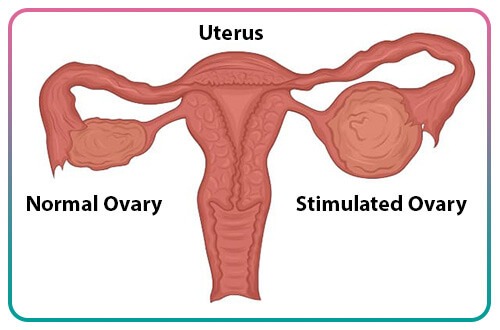
1- In the transfer of frozen embryos, embryos with a longer time interval than when the ovaries are stimulated with hormonal drugs are transferred to the uterus. Therefore, the level of uterine hormones returns to normal, and the embryos are placed in a natural and suitable environment.
2- If the quality of embryos is low, some embryos may be lost during thawing. Therefore, high-quality embryos survive the thawing process. The probability of a healthy pregnancy and delivery was higher. Commonly, 70% of the embryos come out of the frozen state and can continue to live.
How long can you keep frozen embryos?
Frozen embryos can be stored in laboratory conditions for years. The longest-lived births from frozen embryos were twins whose embryos were frozen 30 years ago. However, it is not recommended to store frozen embryos for more than 10 years.
The cost of frozen embryo transfer in Iran
Many couples from different parts of the world travel to Iran to do IVF or receive donated eggs. Usually, in the best infertility treatment centers in Iran, more than two embryos are formed in the IVF process. Therefore, after the first embryo transfer, the remaining embryos are frozen for subsequent transfers. The cost of transferring a frozen embryo in Iran is between 1,000 and 2,500 dollars, depending on the fertility center.
For more information about infertility treatment in Iran, you can contact us.
References:

